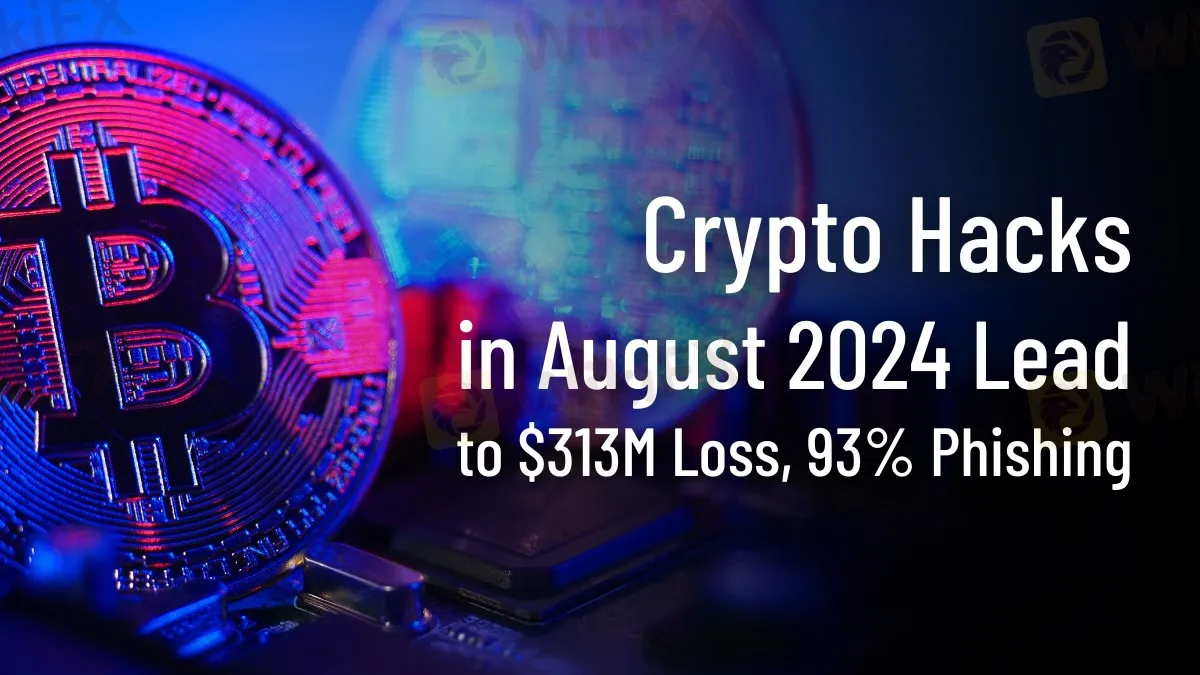简体中文
繁體中文
English
Pусский
日本語
ภาษาไทย
Tiếng Việt
Bahasa Indonesia
Español
हिन्दी
Filippiiniläinen
Français
Deutsch
Português
Türkçe
한국어
العربية
Crypto Hacks in August 2024 Lead to $313M Loss, 93% Phishing
Abstract:Crypto hacks in August 2024 led to $313.86M in losses, with phishing attacks responsible for 93.5%. Bitcoin holders lost $238M. Security improvements are crucial.

August 2024 has proved especially difficult for the cryptocurrency sector, with cyberattacks reaching worrying proportions. According to PeckShield Alert, a renowned cybersecurity tool, the cryptocurrency industry saw over 10 large attacks last month, resulting in a stunning $313.86 million in damages. This unprecedented series of assaults highlights the critical need for improved security in the fast-developing cryptocurrency market.
PeckShield Alert shared these figures on social media, stressing the hazards inherent in the cryptocurrency sector. The large financial losses are mostly the result of a few phishing attempts, which have increasingly become hackers' favored technique of exploiting naïve victims.
Phishing Attacks Dominate Crypto Hacks in August 2024
Phishing assaults caused 93.5% of the losses in August's cryptocurrency breaches, making them the most common kind of exploitation. These assaults drained a staggering $293.4 million from the cryptocurrency market, highlighting the rising menace of phishing attempts in the digital financial industry.

Phishing attacks trick users into providing sensitive information, such as private keys or login credentials, which are subsequently exploited to get access to their digital wallets. Victims are often duped into fraudulent transactions that result in significant financial losses. The scope and regularity of these assaults in August should act as a wake-up call for the cryptocurrency community to implement more stringent security measures.
One of the most severe phishing instances was an assault on Bitcoin holders that resulted in a loss of $238 million in Bitcoin (BTC). Another large phishing fraud took $55.4 million from DAI, a stablecoin, revealing that even reasonably safe digital assets are vulnerable to increasingly sophisticated cyber assaults.
Other Cryptocurrency Exploits in August 2024
While phishing assaults caused the vast majority of damages, other cyber intrusions contributed to the financial devastation in August 2024. Non-phishing crypto breaches caused a total loss of $18.93 million.
One of the more prominent events was the Ronin Network, which was previously attacked in a large-scale hack in 2022. In August 2024, the network had another breach, resulting in a loss of around $12 million. The frequency of assaults on the Ronin Network demonstrates the continued vulnerabilities of decentralized networks and hackers' continual attempts to exploit these flaws.

In addition to the Ronin Network intrusion, an unlawful transaction caused a $5.1 million loss. This incident emphasizes the need to monitor and safeguard transactions to avoid unwanted access. The Nexera Protocol was also attacked in a cyberattack, with the perpetrators taking $1.83 million.
The Need for Enhanced Security in the Crypto Space
The alarming increase in cryptocurrency breaches, especially phishing attempts, in August 2024 has heightened awareness of the crucial need for tighter security measures. As hackers grow increasingly skilled at exploiting flaws in digital banking, the significance of attention and strong protective techniques cannot be overemphasized.
The PeckShield Alert report serves as a sobering warning that, although creative and transformational, the Bitcoin industry is nonetheless susceptible to growing cyber threats. To reduce the danger of falling victim to these expensive assaults, investors and users of digital assets must take proactive steps to secure their holdings and implement best practices.
The significant losses experienced in August 2024 should drive crypto platforms, developers, and consumers to pursue security upgrades and be vigilant about possible dangers. Only by implementing these actions can the cryptocurrency community expect to reduce the financial harm caused by future hacks.

Disclaimer:
The views in this article only represent the author's personal views, and do not constitute investment advice on this platform. This platform does not guarantee the accuracy, completeness and timeliness of the information in the article, and will not be liable for any loss caused by the use of or reliance on the information in the article.
Read more

Bybit Shuts Down NFT Marketplace Amid Crypto Market Downturn
Bybit announces the closure of its NFT marketplace, citing efforts to streamline offerings. Discover the latest trends in the declining NFT market and its shift to utility-based growth.

Galaxy Digital Settles $200M in Luna Token Manipulation Case
Galaxy Digital pays $200M to settle Luna token manipulation probe by NY regulators, linked to TerraUSD’s 2022 crash, impacting crypto market stability.

Vanuatu Passes VASP Act to Regulate Crypto and Digital Assets
Vanuatu's new VASP Act regulates crypto businesses, enforcing strict licensing, AML/CFT compliance, and investor protections.

Why the SEC Rejected the First U.S. Bank-Issued Stablecoin
The SEC rejected the first U.S. bank-issued stablecoin, citing regulatory concerns. This decision highlights the ongoing challenges in crypto asset classification and oversight.
WikiFX Broker
Latest News
The Withdrawal Trap: How Scam Brokers Lure Victims into Paying More
FCA to Investors: Think Twice Before Trusting These Brokers
Trump\s tariffs: How could they affect the UK and your money
Trump gambles it all on global tariffs he\s wanted for decades
TradingView Brings Live Market Charts to Telegram Users with New Mini App
Trump tariffs: How will India navigate a world on the brink of a trade war?
Interactive Brokers Launches Forecast Contracts in Canada for Market Predictions
Authorities Alert: MAS Impersonation Scam Hits Singapore
Stocks fall again as Trump tariff jitters continue
IG Group Acquires Freetrade for £160M to Expand UK Investment Market
Currency Calculator







